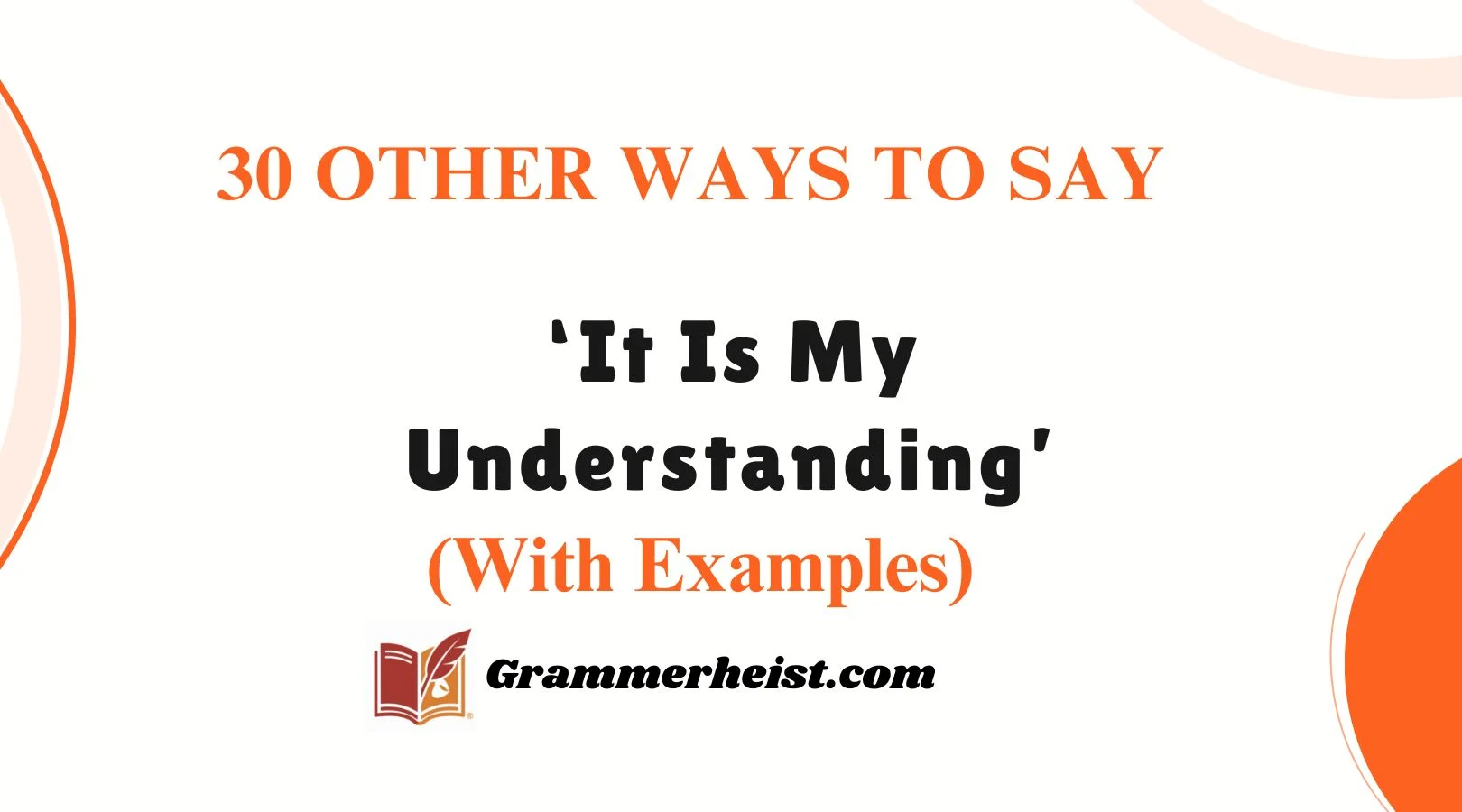When writing or speaking, variety can enhance the clarity and flow of your message. Instead of repeatedly using “according to,” try these alternative phrases to express the same idea in a fresh, engaging way. This collection of phrases will allow you to diversify your language and tailor your statements to different contexts, whether formal, casual, or conversational.
What Does “According To” Mean?
“According to” is commonly used to introduce information, ideas, or sources that support or explain a point. It attributes a statement or opinion to a particular person, group, or publication. Understanding its meaning allows you to effectively use it in various forms of communication, helping to make your argument or message more credible.
Is It Professional/Polite to Say “According To”?
Yes, it is both professional and polite to use “according to” when referencing someone else’s opinion, research, or findings. It shows respect for the source and lends credibility to the information you’re sharing. However, in more formal writing, alternatives might sound more polished or sophisticated.
Advantages and Disadvantages
Advantages:
- Offering alternatives helps to avoid repetition.
- Using varied phrases can improve readability and tone.
- It allows you to be more specific about the source or the context.
Disadvantages:
- Some alternatives may be more formal or less familiar in casual contexts.
- Overuse of alternative phrases could make the writing seem overly complex or convoluted.
According To Synonyms:
- As Stated By
- In the Words of
- As Reported By
- As Per
- In Accordance With
- Based On
- As Declared By
- As Mentioned By
- As Noted By
- As Observed By
- In the Opinion of
- From the Perspective of
- Citing
- Per the
- In Light of
- As Revealed By
- In the View of
- On the Authority of
- As Indicated By
- As Confirmed By
- In accordance with the Findings of
- On the Basis of
- As Asserted By
- From the Report of
- As Expressed By
- From the Conclusion of
- By the Authority of
- As Concluded By
- On the Authority of the Source
- As Observed in
1. As Stated By
Meaning: Used to introduce a direct reference to someone’s statement or writing.
Definition: Indicates that what follows is something previously mentioned by another.
Detailed Explanation: This phrase emphasizes that the following statement was made by a specific individual or organization.
Scenario Example: “As stated by the researcher, these results are preliminary.”
Best Use: Suitable for formal, academic, or professional contexts.
Tone: Neutral, formal, and factual.
2. In the Words of
Meaning: A way to introduce a quote or direct speech from someone.
Definition: Used to introduce the exact words or phrasing someone has used.
Detailed Explanation: Often used when directly quoting a source or referencing a statement.
Scenario Example: “In the words of the CEO, ‘We are committed to excellence.'”
Best Use: Great for emphasizing a direct quote or noteworthy remark.
Tone: Formal, respectful, and direct.
3. As Reported By
Meaning: Refers to information that has been reported by a source.
Definition: Introduces information that was shared by a journalist, publication, or news outlet.
Detailed Explanation: This phrase is commonly used in journalistic and media contexts when referring to a report.
Scenario Example: “As reported by the local news station, the storm caused significant damage.”
Best Use: Best for journalistic or media-related content.
Tone: Neutral, factual, and objective.
4. As Per
Meaning: Used to indicate that something follows the rules or guidelines set by a source.
Definition: Refers to the instruction, guidelines, or authority set by another party.
Detailed Explanation: This is a formal phrase used to refer to instructions or requests that were made by someone else.
Scenario Example: “As per the contract, we are required to submit the report by Friday.”
Best Use: Ideal for formal or business settings.
Tone: Formal, professional, and directive.
5. In Accordance With
Meaning: Similar to “as per,” but can be used in more formal legal or technical contexts.
Definition: Refers to following or complying with guidelines, rules, or policies.
Detailed Explanation: Often used in legal, business, and formal contexts, it emphasizes conformity with specific standards.
Scenario Example: “Per company policy, all staff must complete the training.”
Best Use: Legal or corporate contexts.
Tone: Formal, authoritative, and directive.
6. Based On
Meaning: Refers to something that is derived or influenced by a specific source.
Definition: Used to show that the following information is grounded in a particular source or context.
Detailed Explanation: This is commonly used when referencing a piece of research, data, or opinion.
Scenario Example: “Based on the findings, we recommend moving forward with the project.”
Best Use: Research, analysis, or any context involving evidence.
Tone: Informal to formal, depending on context.
7. As Declared By
Meaning: Refers to something announced or stated officially by someone.
Definition: Introduces a formal statement or announcement made by an individual or body.
Detailed Explanation: This phrase emphasizes authority and formality in a declaration.
Scenario Example: “As declared by the United Nations, climate change is a global priority.”
Best Use: Formal and authoritative contexts.
Tone: Formal, authoritative, and assertive.
8. As Mentioned By
Meaning: Refers to something previously mentioned or referenced by a person.
Definition: Used when referring to information that has already been mentioned by a specific source.
Detailed Explanation: It’s often used when reiterating or summarizing someone’s earlier statement.
Scenario Example: “As mentioned by the speaker earlier, this project is a priority for the team.”
Best Use: Informal or semi-formal settings when summarizing.
Tone: Casual to formal, depending on context.
9. As Noted By
Meaning: Introduces information that someone has specifically pointed out or written about.
Definition: Used to refer to a specific note or observation made by a source.
Detailed Explanation: This phrase suggests that the information has been highlighted or emphasized by someone.
Scenario Example: “As noted by the expert, the solution will take time to implement.”
Best Use: Academic, professional, or detailed discussions.
Tone: Formal, academic, and precise.
10. As Observed By
Meaning: Indicates that a statement or fact was noticed or remarked upon by a particular source.
Definition: Refers to something observed or pointed out by an individual or group.
Detailed Explanation: This phrase is often used in analytical or observational contexts.
Scenario Example: “As observed by the survey participants, customer satisfaction has increased.”
Best Use: Academic, research, or observational contexts.
Tone: Neutral, analytical, and formal.
11. In the Opinion of
Meaning: Introduces a viewpoint or belief held by a person or group.
Definition: Used to present someone’s opinion or perspective on a matter.
Detailed Explanation: It is commonly used when referencing personal or expert opinions.
Scenario Example: “In the opinion of the committee, this policy will benefit the community.”
Best Use: Ideal for referencing opinions in discussions or debates.
Tone: Neutral to formal, depending on the situation.
12. From the Perspective of
Meaning: Refers to a viewpoint or angle from which something is considered.
Definition: Used when discussing how a subject is viewed or interpreted by a particular person or group.
Detailed Explanation: This phrase highlights that the following information represents a specific viewpoint.
Scenario Example: “From the perspective of the employees, the new changes are beneficial.”
Best Use: Discussions involving varying viewpoints.
Tone: Neutral, thoughtful, and analytical.
13. Citing
Meaning: A formal way to refer to a source of information.
Definition: Directly referring to a specific source, often for verification or attribution.
Detailed Explanation: Often used in research and formal writing to back up a claim or idea.
Scenario Example: “Citing the recent study, the report highlights the benefits of remote work.”
Best Use: Academic, formal writing, or research contexts.
Tone: Formal, precise, and scholarly.
14. Per the
Meaning: A concise way to refer to something that follows the guidelines or instructions of another.
Definition: Similar to “as per,” but more informal and brief.
Detailed Explanation: This phrase is often used in business or casual communication when referring to instructions or agreements.
Scenario Example: “Per the guidelines, the report is due by Friday.”
Best Use: Informal business or everyday communication.
Tone: Neutral, informal, and concise.
15. In Light of
Meaning: Refers to considering something based on certain information or events.
Definition: Used to introduce a decision, action, or statement influenced by new information.
Detailed Explanation: This phrase is commonly used when adapting to or reacting to new circumstances or data.
Scenario Example: “In light of the recent research, we will revise our approach.”
Best Use: Used when adjusting actions or thoughts based on new data.
Tone: Analytical, flexible, and thoughtful.
16. As Revealed By
Meaning: Indicates that a piece of information has been disclosed or made known by a source.
Definition: Used to introduce information that has been disclosed or uncovered by a person or organization.
Detailed Explanation: This phrase emphasizes that the information was shared as part of a revelation or finding.
Scenario Example: “As revealed by the investigation, the cause of the issue was a technical error.”
Best Use: Situations where information is disclosed or uncovered.
Tone: Formal, informative, and factual.
17. In the View of
Meaning: Refers to a judgment or interpretation held by a source.
Definition: Similar to “in the opinion of,” but suggests a broader or more objective viewpoint.
Detailed Explanation: This phrase can express an interpretation or analysis of a particular situation.
Scenario Example: “In the view of the experts, the proposed solution will not be effective.”
Best Use: Used in formal, analytical discussions or reports.
Tone: Neutral, formal, and analytical.
18. On the Authority of
Meaning: Refers to a source with expertise or power in a particular field.
Definition: Used when presenting information that is backed by an authoritative source.
Detailed Explanation: This phrase adds weight to the information by referencing a credible source or expert.
Scenario Example: “On the authority of the chief scientist, the findings were confirmed.”
Best Use: Formal, authoritative contexts or when citing experts.
Tone: Authoritative, formal, and professional.
19. As Indicated By
Meaning: Similar to “as stated by,” but can refer to a broader range of references.
Definition: Used to reference information that has been pointed out or suggested by someone.
Detailed Explanation: This phrase is commonly used in both written and spoken contexts to point out references or evidence.
Scenario Example: “As indicated by the survey results, there is a growing demand for online education.”
Best Use: Formal, research-based contexts.
Tone: Neutral, formal, and informative.
20. As Confirmed By
Meaning: Refers to information that has been verified or validated by a reliable source.
Definition: Acknowledges that the information has been validated by an expert or authoritative source.
Detailed Explanation: This phrase implies that the information is trustworthy and verified by a reputable source.
Scenario Example: “As confirmed by the manager, the meeting is scheduled for 3 p.m.”
Best Use: When verifying or validating information from credible sources.
Tone: Formal, trustworthy, and authoritative.
Read More: Other Ways to Say “You Look Handsome” (With Examples)
21. In Accordance with the Findings of
Meaning: Refers to information or results that align with a specific study or research.
Definition: Indicates that the following information is consistent with or follows from a study, research, or expert findings.
Detailed Explanation: This phrase is commonly used in academic, research, or data-driven discussions to present findings or conclusions.
Scenario Example: “In accordance with the findings of the recent study, we can expect an increase in demand.”
Best Use: Academic, research, and analytical contexts.
Tone: Formal, objective, and analytical.
22. On the Basis of
Meaning: Refers to something that is grounded in specific information or evidence.
Definition: Introduces a piece of information or a decision that is based on certain facts, data, or principles.
Detailed Explanation: This phrase emphasizes the evidence or reasoning behind a claim or decision.
Scenario Example: “On the basis of his extensive experience, he was selected for the position.”
Best Use: Formal settings, especially when explaining decisions made with evidence.
Tone: Formal, rational, and methodical.
23. As Asserted By
Meaning: Refers to something strongly stated or declared by someone.
Definition: Introduces a statement or claim made by a particular source with confidence.
Detailed Explanation: This phrase conveys a sense of certainty and authority in the information being referenced.
Scenario Example: “As asserted by the author, the economic policy must be reformed immediately.”
Best Use: Formal writing, especially when referencing strong or authoritative statements.
Tone: Assertive, confident, and formal.
24. From the Report of
Meaning: Indicates information derived from a formal report.
Definition: Used when referencing specific information that was included in a report or document.
Detailed Explanation: This phrase highlights the source of the information, often used in business or formal settings.
Scenario Example: “From the report of the audit team, we have identified several areas for improvement.”
Best Use: Business, academic, and formal reporting contexts.
Tone: Neutral, professional, and formal.
25. As Expressed By
Meaning: Used to introduce someone’s personal or public expression of an idea.
Definition: Refers to a person’s own words or sentiments expressed on a particular matter.
Detailed Explanation: This phrase is often used to emphasize personal opinions or feelings shared by someone.
Scenario Example: “As expressed by the speaker, the future of the industry looks promising.”
Best Use: When emphasizing personal viewpoints or statements.
Tone: Personal, respectful, and informal.
26. From the Conclusion of
Meaning: Refers to the final judgment or results drawn from a piece of work or study.
Definition: Indicates that the following information is derived from the final analysis or conclusion of something.
Detailed Explanation: This phrase is useful when summarizing the outcome of an investigation or study.
Scenario Example: “From the conclusion of the investigation, we can infer that further measures are necessary.”
Best Use: Analytical or investigative contexts, especially when summarizing.
Tone: Formal, analytical, and objective.
27. By the Authority of
Meaning: Indicates that something is backed or endorsed by an authoritative figure or body.
Definition: Refers to information that is supported by someone with recognized authority or expertise.
Detailed Explanation: This phrase adds credibility and weight to the information, especially in formal or legal contexts.
Scenario Example: “By the authority of the board of directors, the proposal has been approved.”
Best Use: Legal, business, and formal settings.
Tone: Authoritative, formal, and professional.
28. As Concluded By
Meaning: Refers to the final decision or outcome drawn by someone, often based on analysis or research.
Definition: Introduces information that has been concluded after careful consideration or study.
Detailed Explanation: This phrase is commonly used to present the final results of an investigation or research.
Scenario Example: “As concluded by the research team, the project will move forward in phases.”
Best Use: Research, academic, and professional reports.
Tone: Formal, factual, and analytical.
29. On the Authority of the Source
Meaning: Indicates that a statement is credible because it comes from a reliable or recognized source.
Definition: Refers to the validity of the information being introduced, backed by an authoritative or reliable source.
Detailed Explanation: This phrase emphasizes the legitimacy of the information being shared due to its source.
Scenario Example: “On the authority of the government agency, the new regulations will take effect next month.”
Best Use: When referring to official or highly credible sources.
Tone: Authoritative, formal, and professional.
30. As Observed in
Meaning: Introduces something that has been noticed, documented, or mentioned in a particular context.
Definition: Refers to something that has been observed or noted in a study, report, or other documents.
Detailed Explanation: This phrase is often used when referencing conclusions or observations made by experts or researchers.
Scenario Example: “As observed in the survey results, most participants prefer online shopping.”
Best Use: Academic, research, or any setting that involves reporting findings.
Tone: Neutral, formal, and analytical.
Conclusion
Choosing the right phrase to replace “according to” can improve the clarity and style of your writing, making it more varied and engaging. Depending on the context—whether formal, academic, or casual—each of these alternatives can add a layer of sophistication or simplicity to your statements.
Experiment with these alternatives to communicate more effectively, while also keeping the tone and formality appropriate to the situation. Whether you are citing a source, giving credit to a statement, or referencing a report, using varied phrases keeps your writing fresh and compelling.

Leo Scott is a passionate writer and editor with a keen eye for detail and a deep love for language. With years of experience in the world of grammar and communication, Leo is dedicated to helping individuals and businesses improve their written content.



